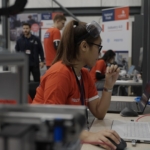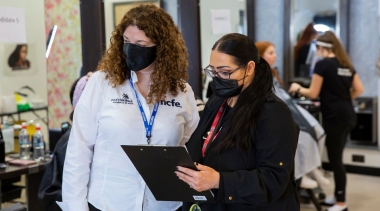Throughout my time with the international squad and team, there have been numerous opportunities to learn from others. Pressure tests and our monthly professional discussions within the international Manufacturing Team Challenge (MTC) community allow us to set best practice using specialists in several areas; machining, welding, electronics and manufacturing specialisms. This allows us all to learn and develop from each other.
Probably the most useful area for me has been in the use of CAD and ISO drawing standards. Though they are very similar to the BSI 8888 British drawings standards, there are differences. In particular, the experts from China, Japan and Russia took me through the ISO requirements and what is considered best practice for the MTC at an international pressure test in Kazan in 2019. China and Japan are regular medal winners in the MTC, while the expert from Russia works for Autodesk who supply the software we use for mechanical drawings. Conversely, I was able to assist them in the best practice and methods of creating electrical and electronic drawings, my specialist area.
Passing learnings on
In CAD classes and project classes, I have been able to embed teaching students to create higher standards of drawings and develop many shortcuts for them to use in doing this. The standard the students in my class have to attain to pass a qualification remains the same, as this is set by the examining body. But, by embedding my learnings from my international work the students are better prepared for CAD jobs in industry and are easily meeting the standards required by the examining body. We have seen success across the department with students securing good jobs in design offices using CAD, one company seeking a single apprentice were so impressed by the candidates they offered an apprenticeship to three.
I remember after a pressure test, the CAD operator from the UK team and I went through everything I had learned and his score in this section of the competition was high. Though he was already at an excellent standard, a few tweaks increased his score.
Further to this I created a video that was placed on YouTube to help support national competitors in creating drawings to ISO standards, which has been reflected in the quality of many teams’ drawings.
Importance of the WorldSkills network
Across my network of MTC experts I have picked up so much information that I have been able to return to the classroom or to other educators. Best practices and differing methods that are quicker or simply yield better results in so many areas. Some improvements are so subtle you would barely notice, but so effective it cuts time and makes the job easier.
Just recently a Squad UK member looking for a place in Shanghai’s team told me how a difficult design assignment found his university classmates struggling but using what he had learned from the Squad training he managed to solve the problem, create the design and submit the work well ahead of time.
The very broad nature of the MTC, means that there is much to learn and know, there are many specialists in many areas feeding into the competition, and many solutions and methods for this from the countries involved. The growth and knowledge for me has been enormous and bringing this back to the UK and being able to pass some on though the WorldSkills UK Skills Development Hub and through my teaching role can only help the much-needed development in the UK.





